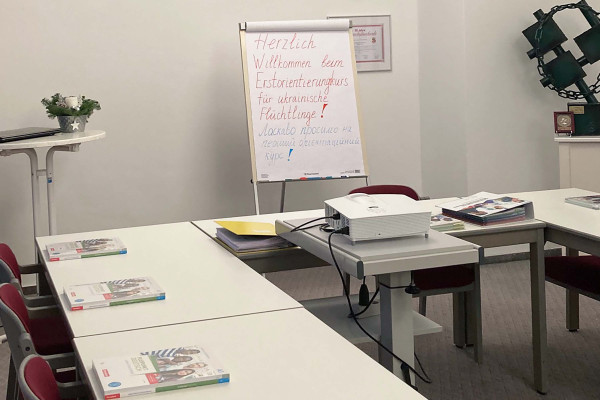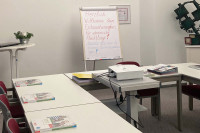Hand tool manufacturer Wiha donates a total of around €5,000 to the communities of Schonach, Triberg, St. Georgen and Mönchweiler for "Refugee Aid Ukraine".
A foreign country, a foreign language, no or little possessions of their own. The chance of integration, education or a job - of improving their circumstances? Without learning German - zero. Many of the people who fled Ukraine this year could certainly describe their situation in this way - if they could.... Their voices are the people who have taken care of them this year in the city and municipal administrations and had to deal with the real circumstances and problems at first hand. In addition, there were completely new organisational and bureaucratic challenges that had to be overcome. Whether in the Schonach, Triberg, St. Georgen or Mönchweiler municipal offices - the statement is always the same: In view of this new and special situation, they are very grateful for the support they have received from many sides this year.
Among them was the company Wiha Tools with locations in Schonach, St. Georgen and Mönchweiler. Throughout the year, the hand tool manufacturer provided quick and unbureaucratic support wherever it was needed - be it with fundraising campaigns or direct and regular financial aid, for example when the state rent subsidies were not sufficient for renting flats. Instead of Christmas presents for business partners or customers, the Wiha management decided in autumn to follow this up and donate around €5,000 for "Refugee Aid Projects Ukraine". Both the communities of the Wiha locations Schonach, St. Georgen and Mönchweiler, as well as the neighbouring town of Triberg from the Schonach headquarters were considered. The concrete use was to be left to the responsible contacts themselves. "We were sure that the administrations would know best how the help could best be received and where the greatest leverage could be applied," explains Wiha CEO Wilhelm Hahn.
In view of the inexhaustible possibilities of where the money could be used in the process, it is now all the more remarkable at the end of the year that there is a common denominator in all four municipalities: language & integration.
Jennifer Hopf, head of the municipal administration in Schonach, is pleased about the language course for Ukrainian refugees that started in November and is expected to run until February in the rooms of the Dom Clemente School. "We are happy that we can now offer around 22 of those affected the chance to learn our language and to be able to take their future into their own hands again from here." The course was very well received, the feedback from the teacher as well as from the participants was consistently positive, as Ms Hopf further explained. "The realisation of the language course was possible thanks to the donation from Wiha. Without this kind of support, many things would not be possible.
Barbara Duffner, head of the main office in Triberg, has similar things to report: "In theory, we can use financial aid everywhere, for example for vouchers from the social department stores, food for the first arrival, smaller purchases for children and young people or for the organisation of get-together afternoons. What is fundamentally lacking, however, is the opportunity for integration and language learning." The standards for the organization of integration courses is so high due to legal requirements that they have become a distant dream, as Ms Duffner further explains. However, one can clearly feel the willingness of people to work and learn for the improvement of their situation. "At the beginning of December, a language course for 21 Ukrainian refugees could also begin in Triberg. If the subsidies for this are not sufficient, we will hopefully be able to keep it going with the donations. If the people are able to communicate, a self-determined life without outside help will come closer bit by bit," concludes Ms Duffner and once again expresses her thanks to Wiha.
In Mönchweiler, the Wiha Christmas donation went towards the purchase of mobile devices for the school lessons of Ukrainian pupils locally and in Königsfeld. Two classes have already been formed, and they would like to continue their school education in Germany or even strive for their school-leaving qualifications. "Be it tablets or food in the canteen - we are creating a safe place for the students to learn our language, work for their educational or professional future. In order to have a perspective again after everything they had to leave behind, such a link to a school day is extremely important," reports Mayor Rudolf Fluck, who is also happy about the donation from Wiha management and thanks them.
In St. Georgen, the money is to flow into the project "Cook & Meet: Ukraine". The success of this concept idea has already been proven in the past with the realisation of "Cook & Meet: Syria" or "Morocco". The idea behind it: The encounter between nations, getting to know each other's traditions and culture. Antonia Musacchio-Torzilli, Integration Officer of the City of St. Georgen, is already looking forward to the Ukraine project: "Cooking, eating and exchanging ideas together builds many bridges. Even if language communication often only takes place with the help of language mediators or ‘with hands and feet’ - the beginning has been made." The events also symbolises an expression of respect and interest for the other culture, she continues... and what better basis to take the next steps towards integration together?





















